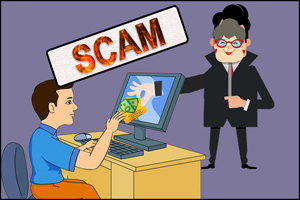Email Fraudulent Fines Scams
Deceptive emails posing as official fine notifications are on the rise. Discover the signs of these fraudulent fines scams and learn how to guard against them.
Email-Related Fraudulent Fines Scams
 The public is cautioned against increasing occurrences of suspicious or deceptive emails. In recent
times, the tactics of scammers have grown more sophisticated.
These criminals often target unprotected computer systems, accessing personal data and wreaking havoc.
While the intentions and methodologies behind these scams remain
nebulous, it's clear that no one is completely immune.
The public is cautioned against increasing occurrences of suspicious or deceptive emails. In recent
times, the tactics of scammers have grown more sophisticated.
These criminals often target unprotected computer systems, accessing personal data and wreaking havoc.
While the intentions and methodologies behind these scams remain
nebulous, it's clear that no one is completely immune.
Although cybersecurity agencies and law enforcement diligently work to uncover these illicit activities, the perpetrators' tendency to frequently shift their identities and locations creates significant challenges. By constantly moving and altering their methods, these scammers make it challenging for authorities to pinpoint and apprehend them.
Despite these challenges, cybersecurity agencies have made significant strides, saving potential victims millions of dollars. Among the most rampant online scams are those involving deceptive emails. Individuals are urged to report any suspicious email activities promptly. Here's a brief overview of some prevalent email scams
-
Nigerian Scams:
In this classic scam, perpetrators pose as government officials or representatives, presenting seemingly official and professionally crafted emails. These emails often promise a large sum of money, suggesting an over-allocated government fund available for public disbursement. Victims are typically asked for a minor deposit and personal details to claim this money. However, once the sum is paid, the scammer disappears.
-
Lottery Scams:
Here, scammers masquerade as lottery agents, proclaiming the recipient has won a substantial sum, like the "UK Lotto Lottery draw of $100,000." However, to claim this prize, a small deposit (e.g., $1500) is demanded. Once the unsuspecting victim pays, the scammer and the promised prize vanish.
- Unfamiliar individuals urgently requesting money transfers
- Unknown senders posing as potential romantic interests asking for money
- Advertisements for property sales or rentals from unidentified sources
- Individuals asking for funds citing emergency medical expenses
- Women portraying themselves as widows in urgent need of financial help


